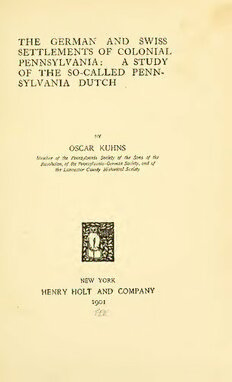
The German and Swiss Settlements of Colonial Pennsylvania: A Study of the So-Called Pennsylvania Dutch PDF
Preview The German and Swiss Settlements of Colonial Pennsylvania: A Study of the So-Called Pennsylvania Dutch
THE GERMAN AND SWISS SETTLEMENTS OF COLONIAL PENNSYLVANIA: A STUDY OF THE SO-CALLED PENN- DUTCH SYLVANIA BY OSCAR KUHNS Member of the Pennsylvania Society of the Sons of the Revolution, of thePennsylvania-GermanSociety, and of the Lancaster County Historical Society NEW YORK HENRY HOLT AND COMPANY 1901 PUBLIC LIBilAiY 12360 15 ASTOB. LENOX AND TILDBN B-OLNUATIOXS It 1039 L Copyright, 1900, BY HENRY HOLT & CO. ROBERT DRUMMOND, PRINTER, NEW YORK. THIS BOOK IS DEDICATED BY THE AUTHOR TO THE MEMORY OF HIS ANCESTORS GEORGE KUNTZ AND HANS HERR PIONEER SETTLERS OF LANCASTER COUNTY, PENNSYLVANIA " Die Enkelgutthun an die Miihen ihrer Vorfahrenzu—denken." Freytag. 3i PREFACE. The object of this book is to give a complete yet concise view of a too-much-neglected phase of American origins. The author has especially tried to be impartial, avoiding as far as possible mere rhetoric, and allowing the facts to speak for themselves. As a book of this kind can have no real value unless it is reliable, authorities have been freely quoted, even at the risk of making the number of foot-notes larger than is perhaps suited to the taste of the general public. Bern, Switzerland, October i, 1900. iii CONTENTS. PAGE Preface . . iii Chapter I The Historic Background i II The Settling of the German Counties OF Pennsylvania 30 HI. Over Land and Sea 62 IV. Manners and Customs of the Pennsyl- vania-German Farmer in the Eighteenth Century 83 V. Language, Literature, and Education. 115 VI. The Religious Life 153 VII. In Peace and in War 193 VIII. Conclusion 221 Appendix—Pennsylvania-German Family Names. . . . 230 Bibliography 247 Index 259 V THE GERMAN AND SWISS SET- TLEMENTS OF COLONIAL PENNSYLVANIA. CHAPTER I. THE HISTORIC BACKGROUND. Of all the great nations of Western Europe during the centuries immediately following the discovery of America, Germany alone took no official part in the colonization of the NewWorld. Spain in Florida and South America, France in Canada and Louisiana, Holland in New York, England in Massachusetts and Rhode Island, and even Sweden in New Jersey, took formal possession of the territory settled by their sub- jects. Previous to the American Revolution it is estimated that over 100,000 Germans and Swiss settled in Pennsylvania alone, to say noth- New ing of York, Maryland, Virginia, Georgia, and the Carolinas. And yet this, for the times, extremely large immigration was not officially recognized by the home country, and the settlers 2 THE HISTORIC BACKGROUND. themselves, instead of founding a German em- pire in the West, became at once the subjects of a foreign power. Nor does it follow necessarily that the German character is not adapted to the work of coloniza- tion at the present time Germany is at least try- ; ing to take her place in this kind of expansion, and the not-distant future may show her to be, in this as in other respects, no inconsiderable rival of England.^ One highly important cause of this emigration " without a head," as it has been called, was un- doubtedly the demoralized condition of Germany in consequence of the terrible civil and religious wars that again and again swept over that coun- try. As a final result of these wars the Holy Roman Empire was broken into fragments one ; half of the German-speaking people were sepa- rated from their fellows and merged with Hun- gary and Bohemia to form Austria while the ; ^ Riehl, the great German ethnologist,—is convinced of the colonizingpowerof his fellowcountrymen, thepeasantclasses at least : " SeineAusdauer und Zahigkeitmachtdendeutschen Bauer zum geborenen Kolonisten. sie liat ihn zu dem gross- artigen weltgeschichtlichen Bcruf geweiht, der Bannertriiger deutschen Geistcs, deutschcr Gcsittung an alien Weltenden zu werden." (Die Biirgerliche Gesellschaft. p. 63.) JohnFiske, however, gives as the only cause of England's supremacy in colonization the principle of self-government. (Dutch and Quaker Colonies, vol. i. p. 131.)
